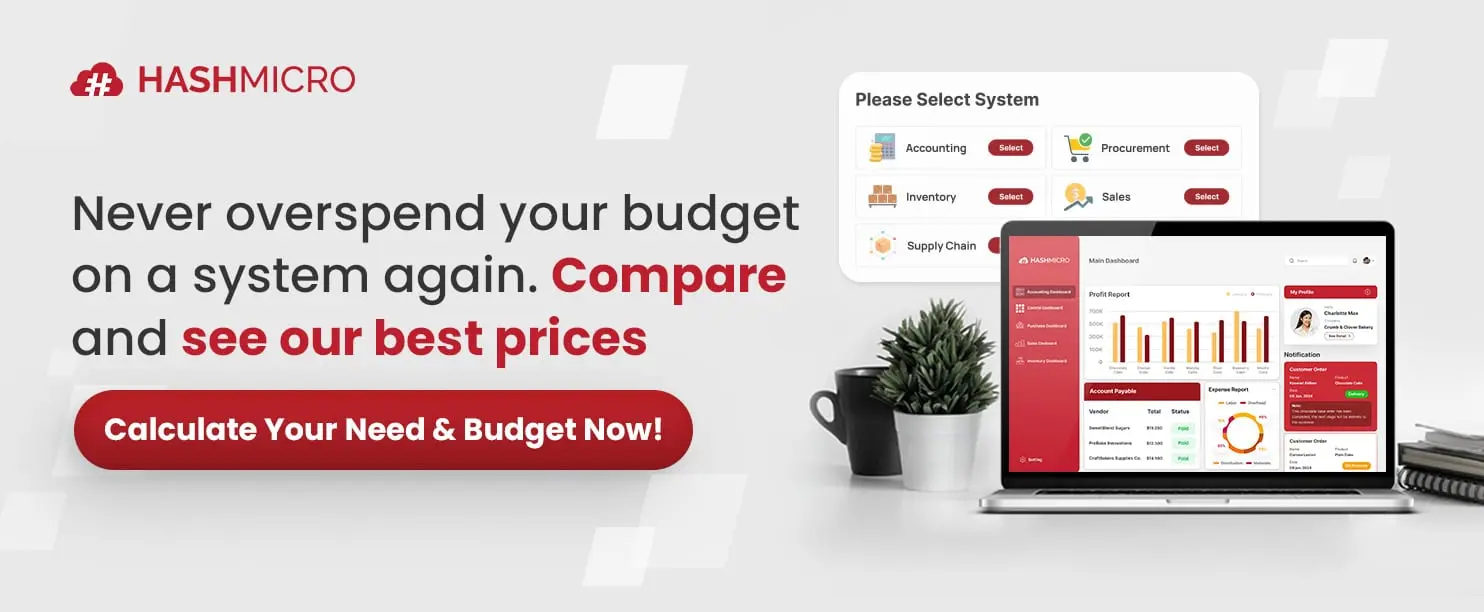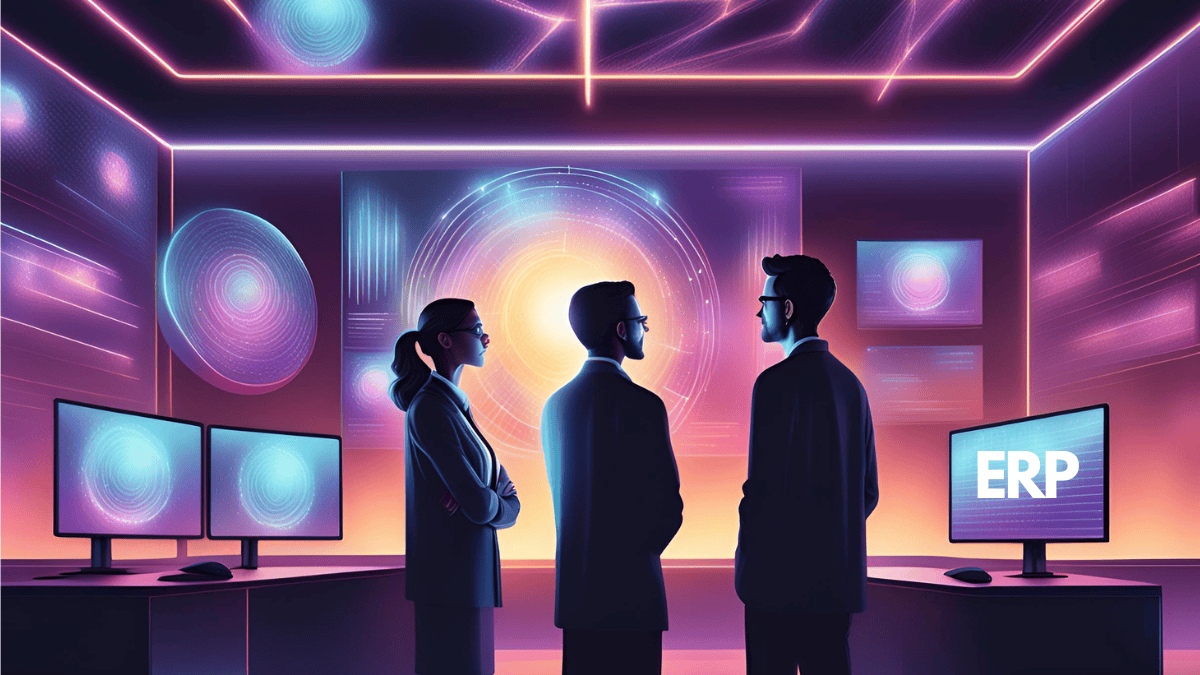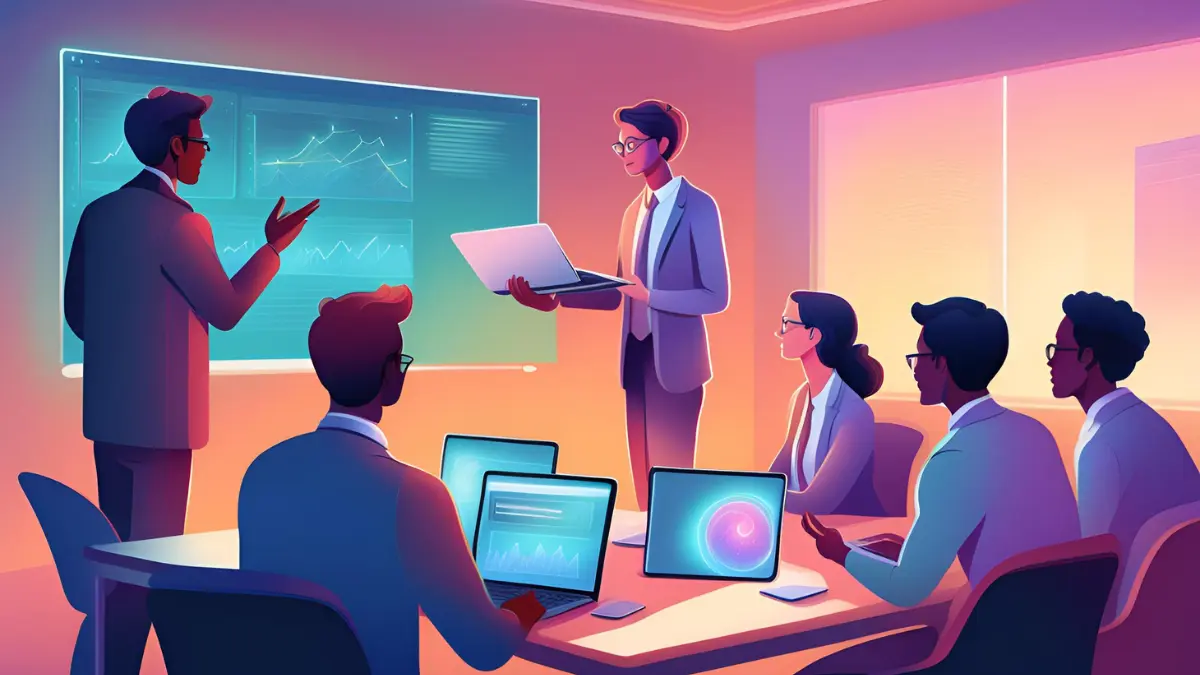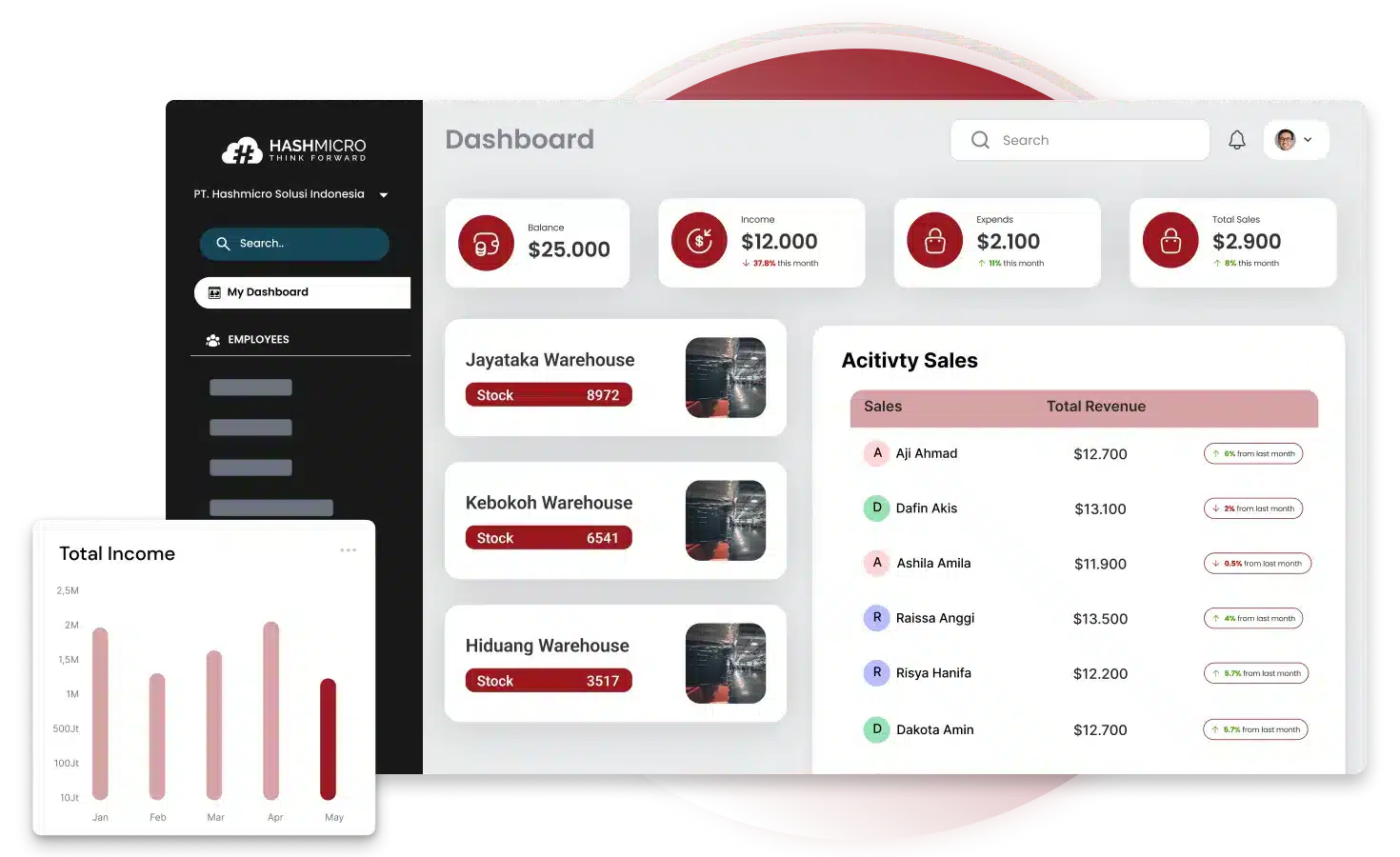There are many marketing opportunities today, but pursuing them manually consumes time and money. Companies frequently experience inefficiencies that disrupt decision-making, resulting in lost opportunities when they lack a structure like ERP software to tie everything together.
ERP software makes it simple to address these typical issues, such as trouble tracking consumer behavior or coordinating marketing with sales. Continue reading this article to learn how ERP software can help enhance your business operation.
To understand its full potential, continue reading this article and explore how ERP software transforms marketing performance, including key considerations when choosing the right ERP software for your business. If you’re curious about applying it in your own business, book a free demo for HashMicro’s ERP software for today.
Key Takeaways
|

What is ERP?
ERP or Enterprise Resource Planning is a software that integrates all business operations onto a single, unified platform. It is a powerful instrument for more effective data management when used to support marketing tools.
ERP simplifies these activities rather than managing different systems for every department, giving marketers uninterrupted access to real-time data. This increases overall efficiency and enables marketers to develop more individualized and focused programs.
The History and Evolution of ERP Software
The origins of ERP software can be traced back more than a century, when manufacturing firms relied on paper-based systems to schedule production. By the 1960s, businesses began adopting computerized applications that, although limited and costly, delivered faster and more reliable results than manual methods.
Over time, these early tools led to standalone systems such as material requirements planning (MRP) and sales order management. By the 1990s, software developers merged these functions into integrated ERP solutions, enabling businesses across industries to streamline operations and increase efficiency.
With improved internet, browser-based platforms led to cloud ERP, expanding functionality and accessibility. Today, ERP utilizes AI, machine learning, and natural language processing for real-time insights, stronger workflows, and competitive advantage.
Why ERP Software Is Important
ERP software serves as the central hub for business data, giving organizations a single, reliable source of truth. This unified system ensures consistency across all departments and allows teams to work together more effectively, reducing errors and improving overall efficiency.
Different functions depend heavily on ERP software to operate smoothly. Finance teams use it to close the books faster, while sales rely on it to manage customer orders. Logistics requires accurate data for on-time deliveries, and procurement uses ERP to streamline sourcing and strengthen vendor relationships.
Other areas benefit as well. Accounts payable ensures suppliers are paid correctly and on time, while managers gain real-time visibility to make faster, better decisions. Banks and shareholders also depend on accurate reporting, which ERP software provides through reliable, up-to-date data and analytics.
ERP Software Examples by Industry
The way businesses use ERP software often depends on their sector, but across industries, the goal is the same: accurate data, efficient workflows, and better decision-making. From manufacturing to services, companies depend on ERP systems to remain competitive.
Manufacturing Companies
Manufacturers in discrete, batch, or continuous production use ERP software to maintain product quality, control labor costs, and maximize asset usage. With real-time inventory tracking, they can identify top-performing products, manage procurement efficiently, and reduce waste.
Retail and E-commerce
Retailers now operate in both physical and digital spaces, making unified data essential. ERP software helps manage product availability, streamline order processing, and integrate channels. This improves online conversions, reduces abandoned carts, and increases overall order values.
Professional Services
Firms in accounting, legal, and engineering rely on ERP software to balance project delivery with profitability. Tools for resource allocation, scheduling, and financial monitoring ensure that services remain on track while also supporting long-term business growth.
Utilities and Energy
Utility providers must continuously assess their infrastructure and prepare for future demand. ERP software simplifies asset replacement planning and inventory forecasting. By managing spare parts accurately, companies avoid costly outages and minimize the expense of unused stock.
Wholesale and Distribution
Wholesalers, logistics firms, and importers use ERP systems to reduce operational costs, increase inventory turnover, and speed up order-to-cash cycles. Automation and integrated logistics tools allow them to better manage supply chains and respond quickly to customer demand.
How ERP Software Works
ERP software operates as a connected system rather than a standalone tool. To understand how it delivers value, it helps to break down its structure, flexibility, and integration methods. Below are the main ways ERP software functions to support business operations.
Core modules and shared database
ERP software is built on modules, each covering a business area like finance, HR, logistics, or procurement. These modules are linked by a central database, which allows them to exchange information seamlessly and provide a single, reliable view of company operations.
Flexible module selection and scalability
Organizations can choose the modules that match their needs and expand over time. Some ERP software includes industry-specific features, while others allow extensions that integrate with external apps. This flexibility makes it easier for businesses to grow and adapt.
Integration with other business systems
For maximum impact, ERP software must connect with other tools such as CRM platforms, HCM systems, and e-commerce solutions. These integrations ensure that data flows consistently, boosting process efficiency and creating stronger collaboration across teams and partners.
Modern integration technologies
Today’s ERP software uses APIs, enterprise service buses (ESBs), and cloud-based iPaaS solutions to link applications. These technologies help synchronize workflows, deliver real-time insights, and improve customer experiences while keeping business operations agile.
How Can ERP Help in the Marketing Industry?
ERP supports marketing by offering an integrated platform that smoothly connects campaign management, customer data, and performance monitoring. This removes divisional data walls, giving marketing teams access to up-to-date data on price, inventory, and customer behavior.
With this data, they can swiftly modify their tactics, guaranteeing personalized and data-driven campaigns that increase engagement and conversion rates. Additionally, by centralizing operations and communication, ERP maximizes cooperation among marketing, sales, and other departments.
While performance tracking technologies enable effective campaign changes, optimize return on investment, and cut expenses, this guarantees that marketing plans align with more general business objectives. This integrated strategy increases the overall effectiveness of marketing initiatives.
Integrating marketing systems with other business ventures is clearly not a simple task. A well-planned and well-calculated system must be applied before you can integrate your marketing division with other divisions. Check our price scheme for more information on how an ERP system could enhance your business operation.

Some Ways ERP Marketing Boosts Efficiency
ERP solutions guarantee that marketing teams work smarter, not harder, by combining data from many sources and automating repetitive processes. This integrated strategy allows businesses to manage campaigns and monitor performance from a single platform.
The following are some significant ways that ERP marketing increases marketing operations’ efficiency:
1. Centralized data for informed decision-making
Data from several departments is combined into a single platform via ERP systems. Thanks to this centralized data, marketing teams can swiftly make educated choices, enhancing consumer segmentation, campaign targeting, and overall strategy. Decision-making processes are sped up since marketing teams no longer depend on scattered information.
2. Automated marketing processes
Automation is a major time-saver in ERP marketing. ERP automates repetitive processes like processing customer orders, sending follow-up emails, and controlling inventory levels.
This automation allows marketing teams to focus on higher-value tasks by reducing manual involvement. Similar automation capabilities are often evaluated in comparisons like Oracle ERP vs SAP for retail automation, where ERP systems are assessed based on their ability to streamline end-to-end retail processes, improve customer satisfaction, and enhance operational efficiency.
3. Enhanced collaboration between teams
ERP systems give real-time data access, promoting improved cooperation between marketing, sales, and other divisions. To ensure that all efforts are directed toward the same objectives, marketing teams can work with sales to make real-time adjustments to price, promotions, and consumer outreach.
4. Improved customer insights
An integrated system offers complete customer insights, including feedback, preferences, and purchasing patterns. This makes marketing teams’ efforts more effective and efficient by enabling them to customize campaigns and promotions specifically to meet customers’ needs. Customized advertising built on accurate information results in increased engagement and conversion rates.
5. Efficient campaign performance tracking
ERP systems combine data from several sources to make tracking the effectiveness of marketing campaigns easier. Marketing departments can readily access metrics like cost per lead, conversion rates, and total return on investment.
Similarly, mining companies can monitor project expenses thanks to the powerful tools that construction ERP systems offer for managing project-specific data.
HashMicro’s ERP System to Boost Your Marketing Efficiency
The all-in-one solution HashMicro’s ERP system provides can transform your marketing initiatives by optimizing data management and workflows. With its integrated approach, you can ensure that every campaign works successfully by removing the frequent problems of disjointed tools and manual processes.
Here are some unique features from HashMicro’s ERP system that help you to enhance marketing efficiency:
- Sales forecast & actualization: This feature analyzes database and market trends to provide sales forecasts and compares them with sales data.
- Customer segment (RFM) analysis: Examine recency, frequency, and monetary values to better identify your consumer categories and target the appropriate audience with tailored advertising.
- Automated promotion management: Automate the management of several promotions in a single order to execute more efficient campaigns with minimal human input.
- Upselling recommendations: This function lets you find upselling chances to increase sales based on frequently purchased items or customer purchase history.
- Sales loyalty management: HashMicro’s ERP system can oversee sales loyalty programs, rewarding devoted clients with points based on their past purchases.
Thanks to these features, HashMicro’s ERP system ensures that your marketing is effective, data-driven, and in line with your overarching business plan. In contrast to other top ERP systems in Malaysia, HashMicro offers automation and real-time analytics that provide your company with a competitive edge while integrating marketing, sales, and operations into a single, seamless system.
Conclusion
Enterprise Resource Planning (ERP) systems have become indispensable tools in modern marketing, streamlining operations, enhancing data-driven decision-making, and improving customer engagement. By integrating various marketing functions—such as CRM, sales analytics, and campaign management—ERP ensures a seamless flow of information, leading to better efficiency and higher ROI
For companies in Malaysia, HashMicro’s ERP software is the best way to maximize integration between marketing and other business operations. The solution enhances customer interaction and operational efficiency with automatic promotion management, upselling advice, and sales prediction & actualization.
The ERP system from HashMicro is the answer you’ve been searching for if you’re prepared to increase your marketing effectiveness and optimize your business processes. Check out our free demo now to see how it may easily improve your marketing efforts!
FAQ about ERP System
-
What is an ERP vs CRM?
A customer relationship management (CRM) system can help you manage customer relationships. On the other hand, an enterprise resource planning (ERP) system allows you to manage various aspects of your business, such as company finances and the customer journey, in a centralized place.
-
What are the 5 components of ERP?
Generally, packages include finance, human resource, logistics and manufacturing, supply chain management, and customer relationship management.
-
Is Excel an ERP system?
ERPs are a single integrated system, making them less vulnerable to human error. On the other-hand, Excel is an extremely manual tool. Instead of being centralized and integrated like an ERP, multiple departments within your organization will rely on different sets of Excel spreadsheets containing the same data.



























